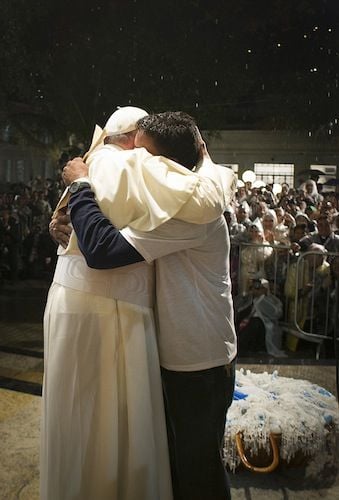 As faithful Catholics, how exactly are we living out the Eucharist, both during the Mass itself and after it is over?
As faithful Catholics, how exactly are we living out the Eucharist, both during the Mass itself and after it is over?
This is the basic question posed by Pope Francis during the second part of his teaching on the Eucharist in February. In the first teaching, the pope reminded us about our real communion with Jesus and his mystery during the Eucharist. Now he challenges us to live out this communion with Christ,
"How do we experience the Eucharist? When we go to Sunday Mass, how do we live it? Is it only a moment of celebration, an established tradition, an opportunity to find oneself or to feel justified, or is it something more?"
Practicing Catholics focus on making sure they attend Mass. The more devout among us, on good days, also pray that we actively share in Christ's Passion by allowing God to nourish our body, mind, and spirit with the Real Presence, the Body and Blood of Christ. However how many of us are open to the needy or hurting around us during Mass or to the poor and marginalized during the days between Masses? These are just a couple of the very specific signals which the pope highlights, "signals that tell us if we are living the Eucharist in a good way or not very well."
Coincidently, I just read an article by a nurse, on her way to Church, who stopped to help victims of a car accident. She left after help arrived but was covered in blood and dirt. Rather than wasting time by going home to change clothes, she decided to simply put her top on inside out to hide most of the mess. Although she missed her own regular Eucharist, she just had time to make it to a nearby Mass at another church. Immediately she felt self-conscious, ill at ease with the kind of attention she attracted but it was at the kiss of peace where she was actually shunned; people ignored her, refusing to make eye contact or shake her hand.
As an upstanding, well-known, active member of her parish, she was shocked by their judgments about what type of person she was. Suddenly this warm, giving nurse realized how the poor, marginalized, and needy must feel every time they step inside a church.
Pope Francis addresses this exact scenario. First he explains that "in the Eucharist, Christ is always renewing his gift of self, which he made on the Cross. His whole life is an act of total sharing of self out of love." Then the pope proceeds to field a series of questions to help us look at our subconscious attitudes and our automatic actions.
The first indicator is our way of looking at or considering others.
There are all sorts of people surrounding us at church but do I feel they are all like brothers and sisters?
Does the Eucharist increase my capacity to rejoice with those who are rejoicing and cry with those who are crying?
Does it urge me to go out to the poor, the sick, the marginalized?
Does it help me to recognize in theirs the face of Jesus?
Do we love, as Jesus wishes, those brothers and sisters who are the most needy? How do I live this?
Do I try to help, to approach and pray for those in difficulty? Or am I a little indifferent?
Or perhaps do I just want to talk: did you see how this or that one is dressed?
Pope Francis's answer to our failure to act with compassion is simple, "Let us ask Jesus, whom we receive in the Eucharist, to help us to help them."
A second indication, a very important one, is the grace of feeling forgiven and ready to forgive.
Hopefully we do not go to church because we want to appear better than others but because we admit that we need to be reborn by the mercy of God, made flesh in Jesus Christ. Pope Francis has harsh words for the proud, "If any one of us does not feel in need of the mercy of God, does not see himself as a sinner, it is better for him not to go to Mass! " We go to Mass humbly because we are sinners and we want to receive God’s pardon.
The last valuable indication comes to us from the relationship between the Eucharistic Celebration and the life of our Christian communities.
I must quote Pope Francis's reflections on this last sign of how we are living out the Eucharist, rather than paraphrasing him , because his words are powerful.
"We must always bear in mind that the Eucharist is an act of Christ because it is Christ, who makes himself present and gathers us around him, to nourish us with his Word and with his life. This means that the mission and the very identity of the Church flows from the Eucharist. A celebration may be flawless on the exterior, very beautiful, but if it does not lead us to encounter Jesus Christ, it is unlikely to bear any kind of nourishment to our heart and our life. Through the Eucharist, Christ wishes to enter into our life and permeate it with his grace, so that in every Christian community there may be coherence between liturgy and life."
Let us live the Eucharist with the spirit of faith, of prayer, of forgiveness, of repentance, of communal joy, of concern for the needy and for the needs of so many brothers and sisters, in the certainty that the Lord will fulfil what he has promised us: eternal life. So be it!
Copyright 2014, Melanie Jean Juneau
About the Author

Melanie Jean Juneau
Melanie Jean Juneau is a mother of nine children who blogs at joy of nine9. Her writing is humorous and heart-warming; thoughtful and thought-provoking. Part of her call and her witness is to write the truth about children, family, marriage and the sacredness of life. Melanie is the administrator of ACWB, the Editor in Chief at CatholicLane, CatholicStand, Catholic365 , CAPC & author of Echoes of the Divine.


.png?width=1806&height=731&name=CatholicMom_hcfm_logo1_pos_871c_2728c%20(002).png)
Comments